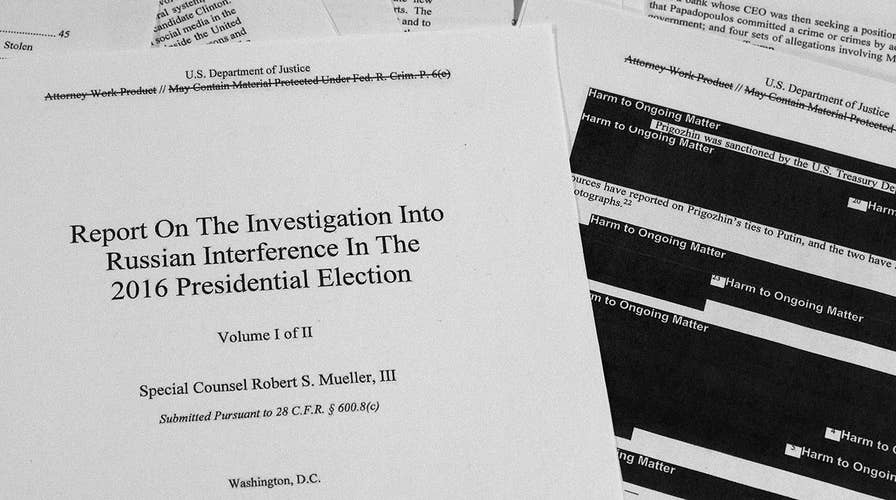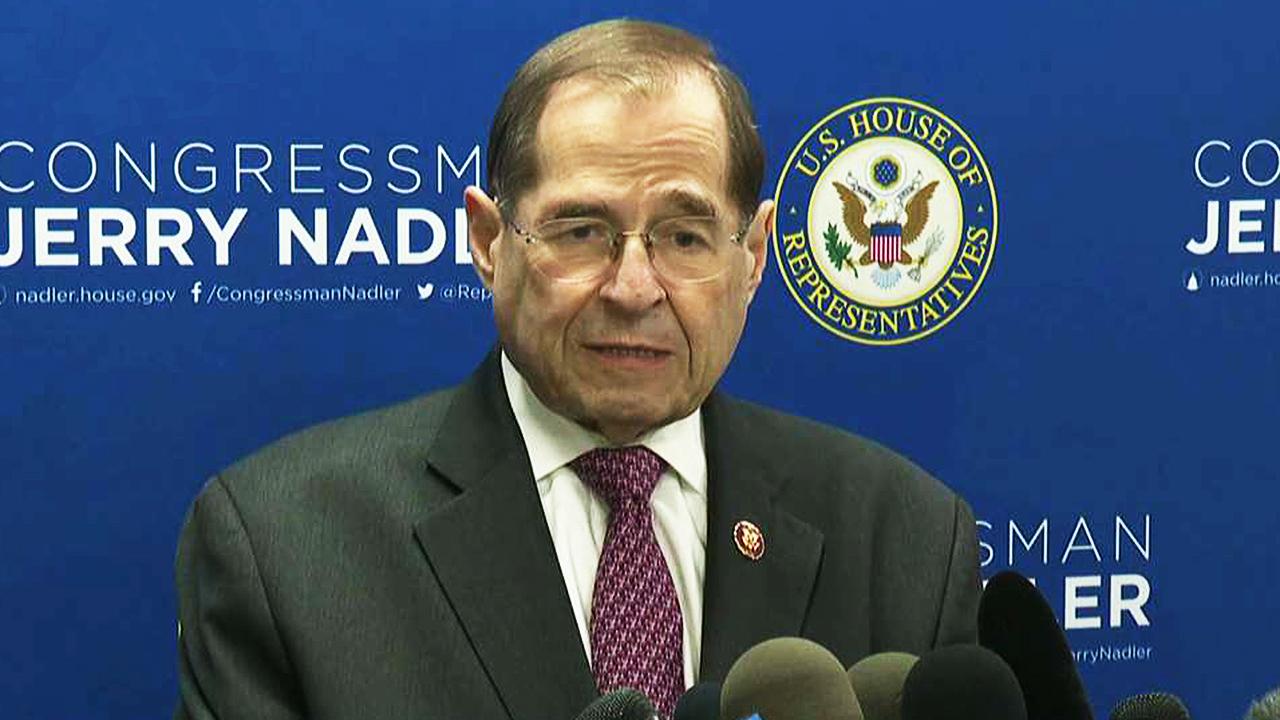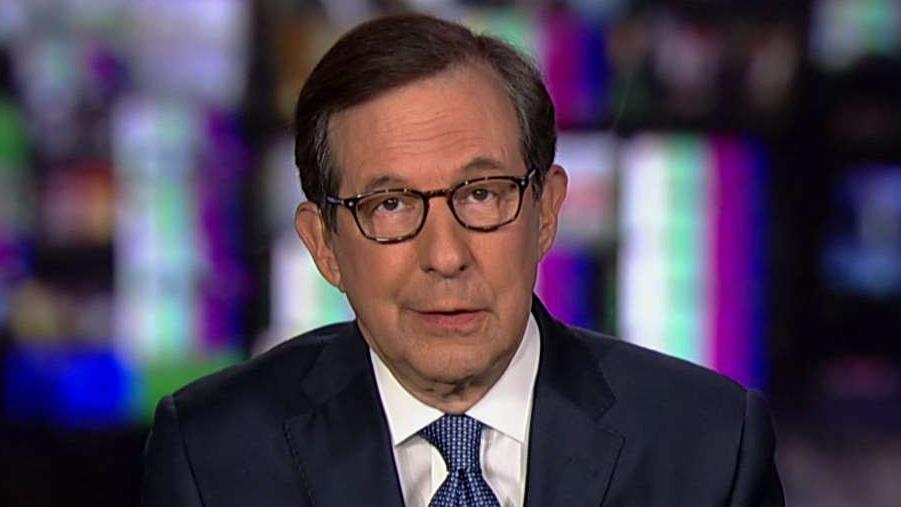Department of Justice releases redacted version of the Mueller report
The Justice Department posts online a redacted version of special counsel Robert Mueller's report on Russian interference in the 2016 presidential election online; chief intelligence correspondent Catherine Herridge reports.
The Mueller Report covered 448 pages.
For context, the 1998 Starr Report about President Clinton and Monica Lewinsky consumed 445 pages.
Other works of popular literature clocking in at around 400 pages or so?
Sense and Sensibility by Jane Austen (409 pages). The Shining by Stephen King (447). Rebecca by Daphne du Maurier (449). Ready Player One by Ernest Cline (374). The Neverending Story by Michael Ende (396).
CLICK HERE TO READ THE REDACTED MUELLER REPORT
Perhaps the last title is most pertinent here.
Attorney General Bill Barr released the Mueller Report in the middle of the first major Congressional recess of the year. Both the House and Senate usually break for more than two weeks in March or April to observe Good Friday, Easter and Passover.
Barr long ago announced he'd make the Mueller Report public in mid-April. But that decision frustrated Congressional Democrats, who viewed the timing as nefarious since Congress was out of session and lawmakers were spread to the four winds.
House Speaker Nancy Pelosi, D-Calif., was in Europe, just concluding a speech to the Dail, or Irish parliament, in Dublin. Senate Judiciary Committee Chairman Lindsey Graham, R-S.C., was in Rwanda. House Judiciary Committee Chairman Jerry Nadler, D-N.Y., was in New York City.
"The logistics make the release much more difficult," protested Sen. Richard Blumenthal, D-Conn., a member of the Judiciary Committee. "The administration seems to be purposely creating obstacles and hurdles to prevent full disclosure." Blumenthal added that Barr should have published the report 'well before the recess. It should've been released the day before it was ready."
Nadler argued that Barr's decision to hold a press conference ahead of publicizing the report was villainous. Nadler portrayed this as an effort by the administration to seize control of the messaging in the absence of lawmakers prowling Capitol Hill. Nadler suggested Barr could then spin the conclusions on behalf of President Trump.
"The Attorney General is not letting facts speak for themselves, but baking in a narrative that benefits the White House and doing it before a holiday weekend so it would be hard for people to react," said Nadler, who held a press conference in New York City late Wednesday to pre-empt Barr – then suggested the attorney general cancel his morning presser.
Releasing the report during the recess may mute some Congressional response. But satellite dishes and TV studios are available this time of year. Twitter remains operational. Most of the country doesn't hang on every word out of Washington and know whether Congress is in or out of session. Many Americans wouldn't interrupt their workday to cull through the Mueller Report, let alone actually read it. They'll rely on others to divine meaning from the special counsel's missive.
The timeframe didn't matter to Lindsey Graham.
"The world keeps turning," said Graham late last week as he departed the Capitol, en route to Africa. "I don't need to know any more. I am done."
There were only a few lawmakers on Capitol Hill when the report hit Washington Thursday morning.
The Constitution requires the House and Senate to convene every three days unless one body grants the other leave to abandon Washington. Otherwise, the House and Senate meet in brief, "pro forma" sessions, when each body just gavels in and gavels out. However, that requires the presence of at least one lawmaker.
Sen. Roy Blunt, R-Mo., drew the lot to serve as the GOP's designated, in-person-at-the-Capitol-spokesman-on-the-Mueller-Report once he rapped the gavel at 11:46 a.m. Thursday. Journalists waited for Blunt in the basement of the Russell Senate Office Building to get his views on the report. A couple of reporters sought out Rep. Don Beyer, D-Va., who presided over the House’s pro forma session late Thursday afternoon.
Congressional Democrats now see a yawning chasm between the contents of the Mueller Report and the interpretation presented by Barr and want to explore that daylight. It starts with the attorney general appearing before the Senate Judiciary Committee on May 1 and the House Judiciary Committee on May 2. That's followed by a prospective appearance by Mueller himself sometime next month.
Nadler believes Mueller left a Hansel and Gretel trail of breadcrumbs through the impeachment forest. When asked Thursday about impeachment, Nadler wouldn't rule it out – despite previous statements by Pelosi to the contrary. A top Pelosi aide tells Fox that impeachment remains out of the question. We may hear more from Pelosi on this score in the wee hours of Friday morning when she appears in Belfast, Northern Ireland and takes part in a Q&A.
There is peril for Democrats if they continue to discuss impeachment, which is why they must drive down both sides of the street. Impeachment talk harms moderate Democrats from battleground districts and lots of them would prefer to focus on policy issues like health care, prescription drugs, infrastructure and even gun policy before discussing impeachment.
However, if liberals push impeachment, moderate Democrats have a chance to contrast themselves, not with Republicans, but with members of their own party. They can say "No. I'm not for impeachment. Let's work on bread and butter issues."
But there is a risk for Democrats if they overplay their hand. That’s why Republicans are more than happy to lump all Democrats together. The key is how Democrats finesse this to satisfy both wings of their caucus.
House Freedom Caucus leader Mark Meadows, R-N.C., told Fox News Thursday that Democrats won’t stop attacking the President. Republicans want Democrats to attack the President. That works for the GOP.
The Mueller Report will dominate the news cycle over the holiday weekend, then wane next week as Congress remains out of session. It could then rise like a phoenix when Congress returns at the end of the month, punctuated by Barr's testimony. That could spark another round of media frenzy, which would then die down before ramping up again if or when Mueller testifies.
This is the downside for Democrats, especially moderates who need to hold their seats in challenging districts. Too much talk about the report diverts attention from other policy priorities. Remember that the only other big legislative item on the docket this year is an imbroglio over the debt ceiling, a government shutdown, and, you guessed it, the border wall.
CLICK HERE TO GET THE FOX NEWS APP
The recess may have actually helped Republicans. They did not want to be in Washington for the release of the report. This is how some Republicans prefer to embrace President Trump: from afar. House Minority Leader Kevin McCarthy, R-Calif., said it was time to move on. House Minority Whip Steve Scalise, R-La., said Democrats should apologize and quit harassing the President and his family.
But remember, the hot take is not always the lasting take. Public perception could shift on this, and that could be damaging to Republicans rushing to embrace what Barr said.
After all, this seems to be the never-ending story.










